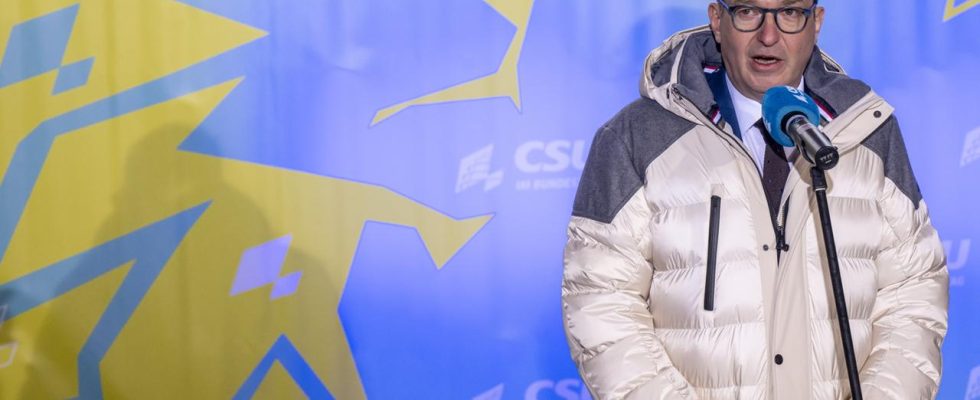The CSU state group started its retreat in Seeon Monastery with a declaration of war: state group leader Dobrindt called for new elections. Party leader Söder spoke of the CSU as a protective force for the common people.
When Markus Söder came to Seeon Monastery at midday, Hans Daxenberger was already there. The farmer from Seeon and around 20 colleagues had parked their tractors at the entrance to the conference venue to emphasize their demands for a complete withdrawal of the plans to cut subsidies – even if they already have the CSU on their side.
Farmer Daxenberger regrets the sometimes violent protests at the Schlüttsiel ferry pier, “because again they said that the farmers were to blame, so that was a farmers’ protest, although you can’t actually say 100 percent whether it really came from the farmers “We want to demonstrate peacefully.”
Around 20 farmers demonstrated in front of the Seeon monastery.
Robust, yes – not radical
Söder also sees it that way. The CSU chairman made it clear at the Seeon monastery: “Peaceful protests must be possible and that in agriculture they are, how should I put it, a bit more rustic, you have to recognize that too. We have experienced that in Bavaria too. You should there Don’t be too afraid now, but if it crosses the step from robustness to radicalism, then it won’t work.”
The CSU’s central demand for the red-green-yellow government coalition is also robust. New elections as soon as possible, emphasized regional group leader Alexander Dobrindt: “The traffic light is simply finished. This country needs a better government. This country needs opportunities instead of Scholz.”
“Commoners Prosperity Projects” as goals
In the resolution paper for the closed meeting, the CSU lists a whole series of so-called civic prosperity projects: relief for medium-sized businesses, tax-free overtime, and a return to nuclear energy.
Party leader Söder made it clear on the first day of the meeting what message she wanted to send out: “We are ready to govern. At any time. We as the CSU want to make it particularly clear that, on the one hand, we are the protective force for the so-called little people, for small medium incomes. The core task is to convey a new security. The Germans want security, an ability to plan – even in difficult times.”
If the Union wins the next federal election, it will need one or more coalition partners to form a government. Söder also made it clear in Seeon that he would prefer the SPD and FDP to the Greens.
EU reforms called for
The CSU also wants to go into the upcoming European election campaign by demanding protection zones for refugees outside Europe. She also demands a radical reduction in the size of the EU Commission from 27 to seven commissioner positions.
This topic was also raised when EU Commission President Ursula von der Leyen arrived in Seeon for talks with the CSU: “Representation in the Commission by a commissioner is enormously important for the member states and especially for the smaller member states and that is why I think I value this principle very highly.”
EU Commission President von der Leyen had to listen to criticism of the Union’s principles.
Why don’t you decide on the K question beforehand?
One topic has so far only appeared in the Seeon monastery on the very side: the question of who will be the Union’s candidate for chancellor. Friedrich Merz or maybe Söder? Last summer, Söder demanded that the decision be waited until after the East German state elections in the fall.
Now he explained that the decision could also be made beforehand: “When an election comes up, we will find a good, common agreement in good time, but we won’t talk about the K question all year long. The current role of favorite is clearly stated Friedrich Merz.” The CSU exam in Seeon Monastery ends on Monday.
Tim Aßmann, ARD Berlin, tagesschau, January 6th, 2024 6:16 p.m

